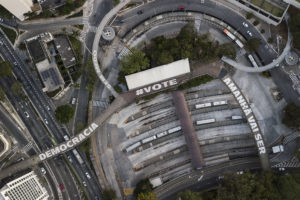On December 15, 2011, WOLA and the National Security Archive co-hosted a discussion to mark the one-year anniversary of the Araguaia ruling in the Inter-American Court on Human Rights (IACHR). The speakers drew on experiences throughout Latin America that could provide insight into the Truth Commission process currently underway in Brazil. The panelists included experts on human rights, Brazilian politics, truth commissions and the right to information.
Background for the event:
On December 14, 2010, the Inter-American Court for Human Rights (IACHR) issued its landmark ruling in the case “Gomes Lund and Others (Guerrilha do Araguaia) v. Brazil.” Among its key findings, the court ruled that by denying families of the victims access to military and other State archives, Brazil had violated their fundamental right to information as defined by the Inter-American Human Rights Convention. The court also issued extraordinary guidelines to Brazil regarding the obligations of the State to search for, locate, and make public government records related to gross human rights abuses.
The Araguaia ruling has broad implications for the development of the right to truth and human rights justice throughout the Americas. To date, Latin American governments have generally refused to open secret archives that may contain evidence of human rights violations. But political and legal pressure in favor of the right to truth and the right to information is mounting. One month ago, Brazil’s President Dilma Rousseff responded to those pressures by signing into law the creation of a truth commission and a new freedom of information law that calls for release of human rights related documentation.
The panel discussion was moderated by WOLA Program Director Geoff Thale, and included the speakers listed below.
- Michael Camilleri, senior legal advisor to the Special Rapporteur for Freedom of Expression at the Inter-American Commission on Human Rights.
- Paulo Sotero, director of the Brazil Institute at the Woodrow Wilson Center
- Jo-Marie Burt, WOLA senior fellow and professor of political science and director of Latin American studies at George Mason University
- Kate Doyle, senior analyst and director of the Evidence Project at the National Security Archive
The speakers discussed the historic nature of the December 2010 ruling by the Inter-American Court, placing it within that larger context of access to information on past human rights abuses in Latin America and the political context of Brazil.
Michael Camilleri explained the context of the Araguaia ruling, its significance, and how it relates to the Inter-American system’s prior jurisprudence on the issue of the right to human rights information. He explained that prosecutors and investigators have a right to government documents that could be relevant to human rights cases, but that governments often avoid giving the requested information by denying that it ever existed or claiming that it has been destroyed.
Paulo Sotero discussed the political situation in Brazil one year after the Araguaia decision and one month after approval of the truth commission and FOI law. He noted that because of the 1979 Amnesty Law and the nature of the Truth Commission’s mandate, there is little chance that the information compiled during the process will be used for prosecution, unless the political climate and public interest dramatically change over the next two years and the Supreme Court decides to revisit the issue of blanket amnesty. He also noted that events that happened before Brazil ratified the Inter-American charter are not subject to its jurisdiction, which will further limit the possibilities for full compliance with the ruling.
Jo-Marie Burt reflected on the implications of the Araguaia ruling for the right to information and human rights in other countries in Latin America, and its possible impact on impunity. She drew on expertise from folling the Truth Commission process and trial of Alberto Fujimori in Peru to show how access to government information can help lead to eventual justice for historic human rights abuses.
Kate Doyle presented the conclusions of a recent meeting in Lima of thirty prosecutors, judges, human rights activists, archivists, and openness activists from ten Latin American countries that shared experiences and strategies for obtaining access to government records in support of human rights and justice struggles. She called on the international human rights community to continue pushing for access to information as a way to seek justice for past and on-going human rights abuses in Latin America.
The speakers agreed that both the IACHR Araguaia ruling and the establishment of the Truth Commission and the FOI law in Brazil are positive developments toward justice for historic human rights abuses in Brazil, but the possibilities of those responsible for the abuses being brought to justice are limited. In other countries, such as Peru and Guatemala, the public's demand for justice was much greater than it currently is in Brazil. Without a shift in political will in Brazil, where the government is focused on current corruption scandals, it is not likely that the results of the Truth Commission will be used to try those responsible for the abuses committed during the military dictatorship. Human rights advocates must make access to information and government accountability a priority to address the problem of impunity, both in Brazil and throughout Latin America. Brazil must fully address historic impunity for human rights abuses before it can advance forward as a rights-respecting democracy.
To watch videos of the presentations, click the links below:
Introduction by Geoff Thale and presentation by Michael Camilleri

